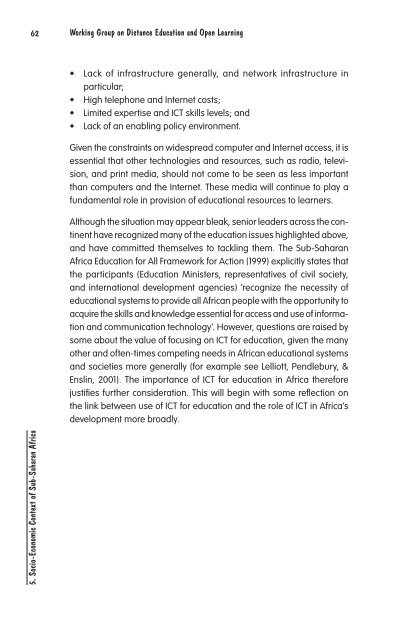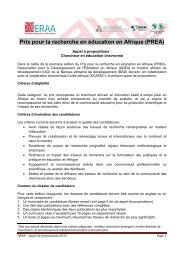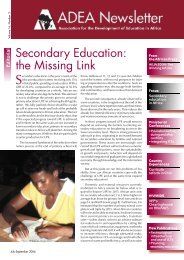Technological Infrastructure and Use of ICT in Education in ... - ADEA
Technological Infrastructure and Use of ICT in Education in ... - ADEA
Technological Infrastructure and Use of ICT in Education in ... - ADEA
Create successful ePaper yourself
Turn your PDF publications into a flip-book with our unique Google optimized e-Paper software.
62 Work<strong>in</strong>g Group on Distance <strong>Education</strong> <strong>and</strong> Open Learn<strong>in</strong>g<br />
• Lack <strong>of</strong> <strong>in</strong>frastructure generally, <strong>and</strong> network <strong>in</strong>frastructure <strong>in</strong><br />
particular;<br />
• High telephone <strong>and</strong> Internet costs;<br />
• Limited expertise <strong>and</strong> <strong>ICT</strong> skills levels; <strong>and</strong><br />
• Lack <strong>of</strong> an enabl<strong>in</strong>g policy environment.<br />
Given the constra<strong>in</strong>ts on widespread computer <strong>and</strong> Internet access, it is<br />
essential that other technologies <strong>and</strong> resources, such as radio, television,<br />
<strong>and</strong> pr<strong>in</strong>t media, should not come to be seen as less important<br />
than computers <strong>and</strong> the Internet. These media will cont<strong>in</strong>ue to play a<br />
fundamental role <strong>in</strong> provision <strong>of</strong> educational resources to learners.<br />
Although the situation may appear bleak, senior leaders across the cont<strong>in</strong>ent<br />
have recognized many <strong>of</strong> the education issues highlighted above,<br />
<strong>and</strong> have committed themselves to tackl<strong>in</strong>g them. The Sub-Saharan<br />
Africa <strong>Education</strong> for All Framework for Action (1999) explicitly states that<br />
the participants (<strong>Education</strong> M<strong>in</strong>isters, representatives <strong>of</strong> civil society,<br />
<strong>and</strong> <strong>in</strong>ternational development agencies) ‘recognize the necessity <strong>of</strong><br />
educational systems to provide all African people with the opportunity to<br />
acquire the skills <strong>and</strong> knowledge essential for access <strong>and</strong> use <strong>of</strong> <strong>in</strong>formation<br />
<strong>and</strong> communication technology’. However, questions are raised by<br />
some about the value <strong>of</strong> focus<strong>in</strong>g on <strong>ICT</strong> for education, given the many<br />
other <strong>and</strong> <strong>of</strong>ten-times compet<strong>in</strong>g needs <strong>in</strong> African educational systems<br />
<strong>and</strong> societies more generally (for example see Lelliott, Pendlebury, &<br />
Ensl<strong>in</strong>, 2001). The importance <strong>of</strong> <strong>ICT</strong> for education <strong>in</strong> Africa therefore<br />
justifies further consideration. This will beg<strong>in</strong> with some reflection on<br />
the l<strong>in</strong>k between use <strong>of</strong> <strong>ICT</strong> for education <strong>and</strong> the role <strong>of</strong> <strong>ICT</strong> <strong>in</strong> Africa’s<br />
development more broadly.<br />
5. Socio-Economic Context <strong>of</strong> Sub-Saharan Africa

















